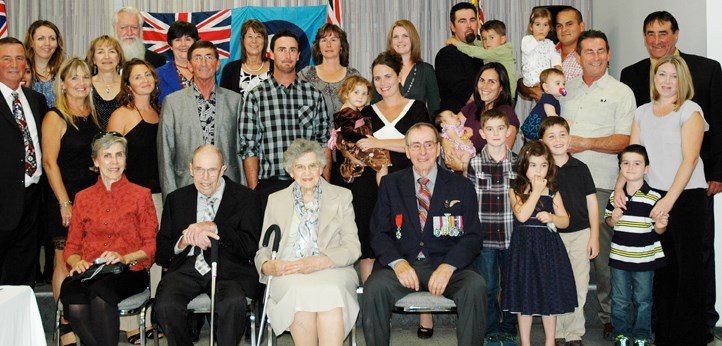Marcel Croteau is an amazing nonagenarian. At the age of 91 he is a living history lesson and a much-decorated veteran of the Second World War who has just earned yet another prestigious award.
Croteau, who lives in Sechelt, received the Knight of the French National Order of the Legion of Honour, France’s highest award, on Sept. 27 in a special ceremony at the Legion Branch 140. Presented by Legion Comrade Joe Brooks, the medal was accompanied by a letter from Phillip Zeller, ambassador of France to Canada, explaining the significance of the decoration.
“This distinction illustrates the profound gratitude that France would like to express to you. It is awarded in recognition of your professional involvement in the liberation of our country. Through you, France remembers the sacrifice of all your compatriots who came to liberate French soil, often losing their lives in the process,” the English translation of the letter reads in part.
Croteau has vivid memories of the war that lead to this recognition from France.
He was a gunner in the conflict. One of seven personnel in the aircraft, his job was an especially challenging one. Facing backwards at the rear of the plane, he perched, legs splayed in a crouching pose, waiting to shoot the enemy, usually in the pitch black. Oftentimes he was exposed to the elements, including temperatures as low as -40, for hours. And this he did 39 times before war’s end.
Croteau credited his upbringing in Bonneyville, Alta. for his ability to do his gunner role so well. He grew up in a French-speaking family on a poor farm during the Depression. His formal schooling ended in Grade 9 when his father needed his help on the land.
“I worked eight horses and a plow breaking land,” Croteau remembered.
The feat required he control four horses with each hand, which made him able to balance in the rear of the aircraft as well as gave him the strength to manage the weight of the big guns.
After Croteau enlisted and passed the entrance exam, he was sent to McGill University in Montreal to upgrade his high-school education. He managed that in three months. He was promoted to sergeant and from there crewed up with a group from Quebec. Then it was on to Halifax and deployment to England. He sailed on the Queen Mary along with 12,500 troops.
On D-Day, June 6, 1944, his squad bombed a German’s munitions factory at Houlgate. Croteau recalled vividly the day.
“They were landing crafts and ships. The channel was covered with craft. We had been waiting for that. The Americans were flying over us; we were given the lower placement. There were 11,000 to 12,000 soldiers on the beaches that day. Just before midnight, we bombed a bridge,” Croteau said.
Later that month, on the 22nd, Croteau received the first of his many awards, the Distinguished Flying Medal from King George VI for “using guns with deadly effect.” During a sortie over a German city, Croteau courageously shot down an enemy aircraft, “characteristic of what he has shown on all occasions.”
A notification of the award was hand delivered to Croteau’s parents, which at first had his mother upset. It was a time when death notices were the norm.
“When they brought the letter for the Distinguished Flying Medal, Mom thought they were coming to tell them the grim news,” he explained.
Croteau recalled meeting another historical figure that day — our present queen. At 19, she was already into a life of service.
When Croteau returned to Canada, he found life difficult. His experiences had convinced him he didn’t want to farm, but the effects of the war had left him with post-traumatic stress and he found it difficult to settle in any job.
In 1980 he took est training, a new-wave way of thinking. The program turned him inward to face his concerns. After that he became a different person better able to cope with daily living.
At age 64 he took up art in a serious way. Beginning with pastels, he progressed through every visual art form. At 71 he decided to go to art school in Montreal for a couple of years. Along the way he sold his art to finance his studies. A prolific talented artist, his home is a veritable art gallery.
Croteau’s other solace is gardening. At home in the soil, his Sechelt yard is a monument to his green thumb with vegetables and flowers galore.
Next up for the intrepid senior is writing. His plans include writing his life story — just one more thing for his five kids, 11 grandchildren and 20 great-grandchildren to be proud of.



